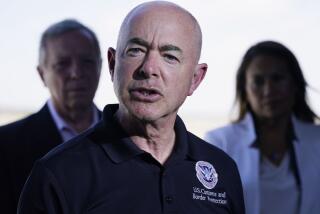Rebuilding FEMA
- Share via
TESTIFYING BEFORE CONGRESS as yet another hurricane bore down on the Gulf of Mexico, Homeland Security chief Michael Chertoff blamed poor planning for his agency’s inept response to the devastation wreaked by Hurricane Katrina.
That’s putting it mildly. An e-mail sent by one of his subordinates in the Federal Emergency Management Agency makes one wonder what sort of disaster the agency was planning for. On Aug. 31, two days after Lake Pontchartrain swept over the levees and flooded New Orleans, the press secretary to FEMA Director Michael Brown complained that Brown hadn’t been allotted enough time to eat dinner in Baton Rouge, where he was temporarily based.
For the record:
12:00 a.m. Oct. 28, 2005 For The Record
Los Angeles Times Friday October 28, 2005 Home Edition California Part B Page 12 Editorial Pages Desk 0 inches; 24 words Type of Material: Correction
FEMA: An editorial Friday referred to the former head of the Federal Emergency Management Agency head as Joseph Allbaugh. His given name is Joe.
The note was the most appalling of the many disturbing e-mails released by lawmakers Thursday. They suggest that Brown -- and by extension, Chertoff -- were cut off from reality and unresponsive to the devastation that was unfolding. But then, lawmakers already had plenty of evidence about those problems. And Chertoff, to his credit, laid out a plan Wednesday for remaking FEMA that acknowledges the agency’s main failings during Katrina.
The improvements actually started Sept. 9, when Chertoff took Brown off the job on the Gulf Coast and sent him back to Washington. Brown resigned from FEMA three days later. Unrepentant, he told lawmakers later that month that state and local officials, not he, were to blame for the bungling. Chertoff, too, stressed that state and local authorities “have both the legal authority and constitutional responsibility to protect and provide for their own citizens.” But he said FEMA needed to improve on four fronts: maintaining the ability to communicate even when phones and power lines are down; moving supplies quickly into a disaster area; ensuring against fraud and waste, and employing seasoned officials -- in sharp contrast to Brown, whose main qualification appears to have been his friendship with former FEMA head and Bush campaign manager Joseph Allbaugh.
Chertoff also pledged to make the country more prepared for disasters by working with communities across the country on their emergency planning. “This includes a hard, realistic look at evacuation planning, ranging from earthquakes to subway bombings,” he testified.
Those are all important goals. In the meantime, FEMA and the Department of Homeland Security have already shown that they have learned from the Katrina fiasco, most notably the need to be engaged and to be able to help as soon as possible. With Hurricane Wilma -- the record-tying 12th hurricane of the season -- due to hit Florida on Sunday, the government will be given another chance to apply those lessons.
More to Read
Get the L.A. Times Politics newsletter
Deeply reported insights into legislation, politics and policy from Sacramento, Washington and beyond. In your inbox twice per week.
You may occasionally receive promotional content from the Los Angeles Times.










